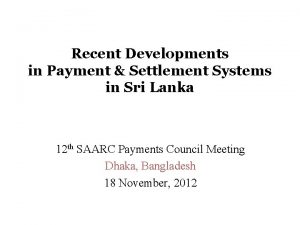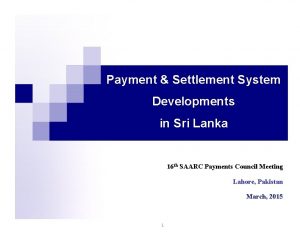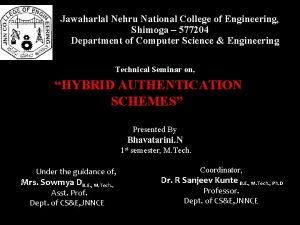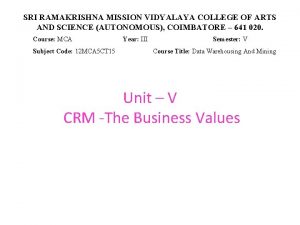SRI NEHRU MAHA VIDHYALAYA COLLEGE OF ARTS AND












































- Slides: 44

SRI NEHRU MAHA VIDHYALAYA COLLEGE OF ARTS AND SCIENCE DEPARTMENT OF COMMERCE COMMERCIAL LAW

WHAT IS LAW The Law is a set of rules that governs the way members of the society act towards one another. q Law is “ that portion of the established habit and thought of mankind which has gained distinct and formal recognition in the shape of uniform rules backed by the authority and power of the government. q

NEED FOR LAW Without law, life and business would become a matter of survival, not only the fittest but also of the most ruthless. q Laws are required in society to regulate the behaviour of the individual, to correspond with what is acceptable to the majority of individuals, q Laws in the potential tool of social change. In fact law and society are complementary. No society can exist without law. It is essential for up keeping of peace in the society. q

BRANCHES OF LAW Constitutional law (Laws which regulates the structure of the principal organs of the govt. ) q Administrative law (Law that governs the executive Branch of the government q Criminal Law (Laws which wrong doers are punished) q Civil Law (Laws which the private rights of an individual are enforced) q Commercial Law (Laws which deals with the rights and obligations of commercial persons emerging from commercial transactions of property) q

COMMERCIAL LAW Meaning q Mercantile law, also known as Commercial Law or Business Law, is that branch of law which governs and regulates trade and commerce. q Is the body of law that applies to the rights, relations and conduct of persons and businesses engaged in commerce, merchandising, trade and sales. q The substantive law concerning the purchase and sale of goods and related matters such as financing of credit, secured transactions and negotiable instruments.

Definition of Commercial Law According to slater, “ the phrase Mercantile law or Commercial law, is generally used to denote that portion of the law which deals with the rights and obligations arising out of transaction between mercantile persons”. Mercantile person one who enter into business transaction and he may be an individual, an association of persons, such as partnership or company.

Contracts introduction v An agreement which creates legal obligations is a contract. The obligation is an undertaking to do or abstain from doing some definite act or acts. v Section 2(h) of the Indian Contracts Act 1872 defines a contract is “an agreement enforceable by law is a contract”. v An agreement which can be enforceable by law is known as a contract. Thus the contract consist of the two elements : (1) An agreement and (2) the agreement must be enforceable by law.

Agreement Enforceability by law

Definition of Contract v. A contract is an agreement made between two or more parties which the law will enforce. v Sir William Anson defines a contract as “a legally binding agreement between two or more persons by which rights are acquired by one or more to acts or forbearances (abstaining from doing something) on the part of the others”. v Salmond, a contract is “an agreement creating and defining obligations between the parties”.

Parties to a Contract q Offeror - The party who makes an offer to enter into a contract q Offeree – The party to whom an offer to enter into a contract is made. Offeror Offer Acceptance Offer makes an offer to the offeree Offeree has the power to accept the offer and create a contract

Elements of Contract 1. Agreement 2. Consideration 3. Contractual 4. Lawful Objects Capacity

Agreement Defined as “every promise and every set of promises, forming consideration for each other What is Promise? When a person to whom the proposal is said to be accepted. A proposal, when accepted becomes a promise An agreement is an accepted proposal to form an agreement there must be an proposal or offer by one party and its acceptance Agreement = offer + acceptance

Following characteristics of an agreement become evident: • Plurality of persons • Consensus-ad-idem Plurality of persons: There must be two or more persons to make an agreement because one person cannot enter into an agreement with himself.

Consensus-ad-idem That the parties to the agreement must have agreed about the subjectmatter of the agreement in the same sense and at the same time. Eg : A who owns two horses named rajhans and hansraj, is selling horse rajhans to B. B thinks he is purchasing horse Hansraj. There is no consensus an idem and consequently no contract.

Obligation An Agreement to become a contract must give a Legal obligation or Duty. The term “obligation” is defined as a legal tie which imposes upon a definite person to persons the necessity of doing or abstaining from doing a definite act or acts It may relate to social or legal matters An agreement which give rise to a social obligation is not a contract. It must give rise to a legal obligation in order to become a contract

CONSIDERATION q Consideration is one of the essential elements to support a contract. An agreement made without consideration is nudum pactum (a nude contract) and is void. q Consideration is a technical term used in the sense of quid pro quo (i. e. , something in return). q When a party to an agreement promises to do something , he must get “something” in return. This “something” is defined as Consideration.

CONTRACTUAL CAPACITY v The parties who enter into a contract must have the capacity to do. ‘Capacity’ means Competence of the parties to enter into a valid contract. v Every person is competent to contract who (a) Is of the age of majority. (b) Is of sound mind and (c) Is not disqualified from contracting by any law to which he is subjects

Essentials elements of valid contract Offer and acceptance Intention to create legal relationship Lawful considerations Capacity of parties- competency free and genuine consent Lawful object Agreement not declared void Certainty and possibility of performance Legal formalities

1. Offer and acceptance There must be two parties to an agreement i. e. , one party making the offer and other party accepting it. The term offer must be definite and the acceptance of the offer must be absolute and unconditional. The acceptance must also be according to the mode prescribed and must be communicated to the offeror. 2. Intention to create legal relationship When the two parties enter into agreement, their intention must be create legal relationship between them. If there is no such intention on the part of the parties, there is no contract between them.

3. Lawful consideration 1. An agreement must be supported by lawful consideration on both sides. 2. Consideration means an advantage/benefit moving from one party to the other. 3. Simple words “Something in return” 4. The agreement is legally enforceable only when the both the parties give something and get something in return

4. Capacity of Parties 1. The parties to an agreement must be competent to contract, otherwise it cannot be enforced by a court law. 2. If any of the parties to the agreement suffers from minority, lunacy, idiocy, drunkenness, etc. . , are incompetent to contract 3. Under section 11 of the act, “Every person is competent to contract who is of the age of majority according to the law to which he is subject, and who is of sound mind and not disqualified from contracting”

5. Free and genuine consent The consent of the parties to the agreement must be free and genuine. The consent of the parties should not be obtained by misrepresentation, fraud, under influence, coercion or mistake. If the consent is obtained by any of these flaws, then the contract is not valid. 6. Lawful object The object of the agreement must be lawful. In other words, it means that the object must not be (a) illegal, (b) immoral, or (c) opposed to public policy.

7. Agreement not declared void The agreement must not have been expressly declared to be void by any law in force in the country. Some agreements declared to be void by law of the country, then such agreements if entered into shall not be enforceable by law. 8. Certainty and possibility of performance The agreement must be certain and not vague. If it is vague and it is not possible to ascertain its meaning it cannot be enforced. 9. Legal formalities Contract may be oral or in writing. Whatever, a particular type of contract is required by law to be in writing, it must comply with the necessary formalities as to writing, registration and attestation, if necessary

classification of contracts Contract may be classified VALIDITY PERFORMANCE FORMATION

Classification of Contracts on the Basis of Formation Express Contract – A Contract expressed in oral or written words. Sec. 9 provides that “In so far as the proposal or acceptance of any promise made in words the promise is said to be express”. An express promise will result in an express contract. When such contract is formed, there is no difficulty in understanding the rights and obligations of the parties. Eg: A writes a letter to B that he offers to sell his car for Rs. 50, 000 and B in reply informs A that he accepts the offer. This is an express contract. v

Classification of Contracts on the Basis of Formation v Implied-in-fact Contract – A contract inferred from the conduct of the parties. Sec. 9 further states “In so far as such proposal or acceptance is made otherwise than in words, the promise is said to be implied. Such contract comes into existence on account of act or conduct of the parties. Eg: Mr. A went to a restaurant and took a cup of coffee. In this, there is an implied contract that he will pay for the cup of coffee, even though he makes no express promise to do so.

Classification of Contracts on the Basis of Formation v Quasi Contract – A contract implied by law to prevent unjust enrichment. There are certain dealings which are not contracts strictly, though the parties act as if there is a contract. In fact, it is an obligation which the law creates in the absence of any agreement. It rates on the ground of equity that “ a person shall not be allowed to enrich himself unjustly at the expense of another. Eg: Mr. X supplied Y, a lunatic, with necessaries to his conditions in life. In this case, X is entitled to be reimbursed from Y’s estate.

Classification of Contracts on the Basis of Formation v Formal Contract – A contract that requires a special form or method of creation. The Contracts under seal are in writing and signed by the parties to them. v Informal Contract – A contract that requires no special form or mode of creation.

Classification of Contracts on the Basis of enforceability (Legal Validity) v Valid Contract – A contract which satisfies all the legal requirements laid down in sec. 10 of the Act, is known as a valid contract. A valid contract is an agreement which is binding and enforceable at law. Void Agreement – “An agreement not enforceable by law is said to be void”. (Sec. 2(g)). A void agreement has no legal effect. It confers no rights on any person and creates no obligations. Such an agreement is without any legal effect abinitio ( from the very beginning). Eg: An agreement with a minor, for instance, is void from the beginning. The same is true of agreements in restraint of marriage, in restraint of trade, uncertain agreement etc. v

Classification of Contracts on the Basis of enforceability (Legal Validity) v Void Contract – A void contract is that which is not enforceable by law. Sec. 2 (j) of the Act lays down that “An contract which is enforceable by law becomes void when it ceases to be enforceable”. A contract which is enforceable by law at the time it was made. Eg: A promised to marry B. Later on B died. In this case, the contract becomes void on the death of B. Voidable Contract – “ An agreement which is enforceable by law at the option of one or more of the parties thereon, but not at the option of the other or others, is a voidable contract”. A voidable contract is one which is enforceable by law at the option of one of the parties. Eg: A agreed to sell his cat to B for Rs. 60, 000. the consent was obtained by use of force. The contract is voidable at the option of A. A can put an end to this contract, if he so decides. v

Classification of Contracts on the Basis of enforceability (Legal Validity) v Unenforceable Contract : The unenforceable contract are those which cannot be enforced in a court of Law because of some technical defects. In certain cases, there are special provisions of law which require some formalities to be fulfilled, e. g. , there are special provisions which provide that a contract must be in writing, or it must be registered, or it must be properly stamped or it must be attested etc. Illegal Agreement: An agreement is illegal and void if its object or consideration: (a) Is forbidden by law (b) Is fraudulent (c) Involves or implies injury to the person or property of another. (d) The court regards it as immoral, or opposed to public policy(sec. 23) v

Classification of Contracts on the Basis of performance Bilateral Contract – A bilateral contract is one in which the obligations on the part of both the parties to the contract are outstanding at the tome of formation of the contract. In such contracts, promise on one side is exchanged for a promise on the other. It is similar to executory contract. Eg: Mr. A promised to paint B’s house for a sum of Rs. 500. it is a bilateral contract as there is exchange of promises and obligations of both the parties are outstanding at the time of formation of the contract. v v Unilateral Contract – In certain contracts one party has to fulfil his obligations, whereas the other party has already performed his obligations. Such a contract is called “Unilateral” or “one sided contract” or “Contract with executed consideration”.

Classification of Contracts on the Basis of performance v Executed Contract – A contract that is fully performed on both the sides. When both the parties have completely performed their respective obligations, under the contract, the contract is said to be executed. Executory Contract – A contract that is not fully performed by one or both sides. In this contract the obligations of the parties are to be performed at a later time. Eg: Mr. A agrees to sell his bus to B for a certain amount. Delivery and payment are to be made in the month following. The contract is said to be executory. v

Offer An offer is a proposal by one party to another to enter into legally binding agreement with him Eg: A says to B “ will you purchase my car for Rs. 50000? ”. A, in this case, is making an offer to B as he signifies to B his willingness to sell his car to B for Rs. 50000 with a view to obtaining B’ assent to purchase the car The person making the offer is known as the offeror, proposer, or promiser and the person to whom it is made is called the offeree or proposee. When the offeree accepts the offer he is called the acceptor or promisee

When an offer is made to an definite person it is called specific offer When an offer is made to the world at large it is called general offer What constitutes an offer? The offer must show an obvious intention on the part of the offeror to be bound by it The offeror must make the offer with a view to obtaining the asset of the offeree to such act The offer must be definite It must be communicated to the offeree

Legal rules as to offer Offer must be such as in law in capable of being accepted and giving rise to legal relationship Terms of offer must be definite, unambiguous and certain and not loose and vague Offer must be communicated Offer must be made with a view to obtaining the assent Offer should not contain a term the non-compliance of which may be assumed to amount to acceptance A statement of price is not an offer

Types of offer v. General offer v. Specific offer v. Counter offer v. Cross offer v. Standing offer v. Express offer v. Implied offer

ACCEPTANCE A Contract emerge from offer and acceptance of an offer. Acceptance is the act of assenting by the offeree to an offer. It is the manifestation by the offeree of his willingness to be bound by the terms of the offer. Acceptance may be Express or Implied. It is express when it is communicated by words, spoken, or written. It is implied when it is to be gathered from the surrounding circumstances or other conduct of parties. Acceptance means in general communicated acceptance.

Acceptance definition Sec. 2 (b) defined acceptance as “When one person to whom the proposal is made signifies his assent thereto, the proposal is said to be accepted. A proposal, when accepted becomes a promise”.

who can accept An offer can be accepted only by the person or persons for whom the offer is intended. An offer made to a particular person can be only accepted by him because he is the only person intended to accept. But an offer made to the world at large can be accepted by any person whatsoever. To constitute a valid acceptance the assent must be communicated to the offeror.

Essentials and legal rules for a valid acceptance Acceptance must be Absolute and Unqualified (sec 7(1)) It must be communicated to the offeror. It must be according to the mode prescribed or usual and reasonable mode. It must be given a reasonable time. It cannot precede an offer. It must show an intention on the part of the acceptor to fulfil terms of the promise. It must be given by the party or parties to whom the offer is made. Acceptance may be Express or Implied.

REVOCATION OF OFFER AND ACCEPTANCE Revocation means “taking back”, “recalling” or “withdrawal”. It may be a revocation of offer or acceptance. A proposal may be revoked at any time before the communication of its acceptance is complete as against the proposer, but not afterwards. An acceptance may be revoked at any time before the communication of the acceptance is complete against the accepter, but not afterwards.

REVOCATION OF OFFER By notice By lapse of time After expiry of reasonable time By death or Insanity By non-fulfilment of conditions By counter offer By rejection by offeree

REVOCATION OF ACCEPTANCE An offeree may reject the offer. Once he does that he cannot subsequently accept it. Rejection offer may be express or implied. Express Rejection : The offeree may reject the offer expressly, i. e. , by words written or spoken. It is effective only when notices of rejection reaches the offeror. Implied Rejection : Rejection of offer is implied by law: (a) Where the offeree makes a counter-offer (b) Where the offeree gives a conditional acceptance.
 Sri rama sri rama sri manoharama
Sri rama sri rama sri manoharama Definition of pakistan studies
Definition of pakistan studies Nehru report
Nehru report Creative arts grade 8 visual art
Creative arts grade 8 visual art Difference between wholesaler and retailer
Difference between wholesaler and retailer Queens college in thanjavur
Queens college in thanjavur Bon secours college mannargudi
Bon secours college mannargudi Dorothy f schmidt college of arts and letters
Dorothy f schmidt college of arts and letters Ves college of arts science and commerce
Ves college of arts science and commerce Prehealth uf
Prehealth uf Lahc nursing
Lahc nursing Ilfracombe arts college
Ilfracombe arts college Maha tıp
Maha tıp Mikroanjiyopati
Mikroanjiyopati Maha khachab
Maha khachab Suci suci suci tuhan maha kuasa
Suci suci suci tuhan maha kuasa Maha ravana raula
Maha ravana raula Beriman kepada tuhan
Beriman kepada tuhan Maha teguh dan tegar asmaul husna
Maha teguh dan tegar asmaul husna Maha district 6
Maha district 6 Al bashir artinya allah maha
Al bashir artinya allah maha Shelterdness
Shelterdness Allah maha esa
Allah maha esa Katakanlah dialah allah yang maha esa
Katakanlah dialah allah yang maha esa Voltērs
Voltērs Ttp diagnostic criteria
Ttp diagnostic criteria Maha el keshawi
Maha el keshawi Maha ka matlab
Maha ka matlab Dr maha dabbagh
Dr maha dabbagh Rikob adalah
Rikob adalah Allah maha kudus
Allah maha kudus Ayat alquran tentang kematian
Ayat alquran tentang kematian Dengan nama allah yang maha pemurah
Dengan nama allah yang maha pemurah Thirukkudanthai andavan
Thirukkudanthai andavan Shivani mantra
Shivani mantra Pengertian iman kepada allah
Pengertian iman kepada allah Negara berdasarkan ketuhanan yang maha esa
Negara berdasarkan ketuhanan yang maha esa Allah maha teliti asmaul husna
Allah maha teliti asmaul husna Dengan nama allah yang maha pemurah
Dengan nama allah yang maha pemurah Food and beverage industry in sri lanka
Food and beverage industry in sri lanka Compare india and sri lanka on the basis of hdi
Compare india and sri lanka on the basis of hdi Payment and settlement system in sri lanka
Payment and settlement system in sri lanka Lanka settle system
Lanka settle system Payment and settlement system in sri lanka
Payment and settlement system in sri lanka Sri lanka auditing standards in sinhala
Sri lanka auditing standards in sinhala


































































